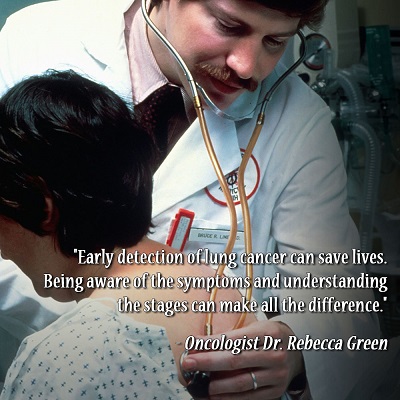 Lung cancer is unfortunately quite common these days, yet many still underestimate its seriousness. Maybe it’s because people often think, “It won’t happen to me,” and let’s hope it stays that way!
Lung cancer is unfortunately quite common these days, yet many still underestimate its seriousness. Maybe it’s because people often think, “It won’t happen to me,” and let’s hope it stays that way!
Lung cancer starts when cells in your lungs begin to divide uncontrollably, forming tumors that can interfere with how your lungs function. It typically begins in the airways or air sacs of the lungs.
Sometimes, cancers from other parts of the body can spread to the lungs, but they’re named after where they started. For instance, lymphomas start in the lymph nodes, and sarcomas in bones or soft tissues.
Symptoms of Lung Cancer
Lung cancer symptoms can sometimes mimic common illnesses, making it tricky to recognize early on. Some people don’t even notice any symptoms until the cancer has progressed, while others might experience signs even in its early stages.
One of the earliest signs can be a persistent cough that doesn’t seem to go away, or recurrent bouts of pneumonia that keep coming back despite treatment. These could be red flags to pay attention to.
Other symptoms to watch for include the following:
- Feeling like you can’t catch your breath, especially with normal activities.
- A persistent change in your voice, often becoming raspy or hoarse.
- Chest pain, particularly when you cough or breathe deeply. You might even have pain in your shoulders, sometimes spreading from the chest.
- You might lose weight without trying, and wonder what the reason is. You might even lose your appetite and lose all interest in food.
- A wheezing or whistling sound when you breathe.
- If you cough there is blood or you might see blood in your phlegm.
- Feeling unusually tired or weak, even with enough rest.
If you notice any of these symptoms persisting, or worsening over time, go and see your doctor!
Stages of Lung Cancer
Cancer is assigned a stage, based on how big the tumor is and how far it goes into the surrounding tissue, and whether it has spread to other organs. Each stage describes the severity, so naturally, the higher the stage, the more advanced the spread of cancer.
The stage of lung cancer helps doctors determine the most effective treatment plan. Early stages, 1 and 2, are generally easier to treat, while later stages, 3 and 4, may require more aggressive therapies. Here are the stages explained.
- Stage 1 – The cancer is small and hasn’t spread beyond the lung.
- Stage 2 – The cancer has grown larger and may have spread to nearby lymph nodes.
- Stage 3 – The cancer has spread more extensively to nearby tissues, lymph nodes, or structures near the lung.
- Stage 4 – The cancer has spread to distant organs, such as the liver, bones, or brain.
Management and Treatment of Lung Cancer
How is lung cancer treated? The goal of the treatment is to remove the cancer or slow down its growth. Some treatments destroy the cancerous cells or boost your immune system to fight them. There are also therapies to help reduce the cancer growth.
Here are some of the common treatments for lung cancer depending on how much it has spread, and other factors.
Chemotherapy
Chemo is a combination of multiple medications used to stop tumors from growing. It’s usually administered before undergoing any sort of surgery, or as a follow-up treatment after surgery. It’s also used in combination with other treatments like immunotherapy.
Immunotherapy
Cancer has a way to avoid being recognized by the immune system, which normally spots and destroys harmful cells. Immunotherapy boosts the immune system’s ability to recognize these cancer cells and helps the body fight them.
Surgery
If the cancer hasn’t spread or there’s only a single tumor, the surgeon may try and remove the cancer through surgery. Sometimes, the surgeon might remove a part of the lung to better the chances that the tumors don’t return.
Radiation Therapy
Radiation therapy uses high-energy beams to destroy cancer cells. It can shrink tumors and relieve pain. Sometimes, it’s enough of a treatment by itself. If not, then surgery and chemo may also be needed.
Targeted Drug Therapy
Some lung cancer cells mutate in a specific way. Targeted drug therapy uses special drugs to focus on these mutations, slowing down their growth or destroying cancer cells.
Lung cancer can happen to anyone, although certain factors can increase or decrease the likelihood of developing it. The primary risk factor is, of course, smoking, which significantly raises the chances of developing lung cancer.
However, don’t be fooled! Non-smokers can also develop lung cancer due to exposure to secondhand smoke, air pollution, or genetic factors. Plus, if you have a family history of lung cancer or certain lung diseases, you may be told you are at a higher risk.
So while anyone can get lung cancer, maintaining a healthy lifestyle and avoiding all the bad things in life can help you reduce your risk!






